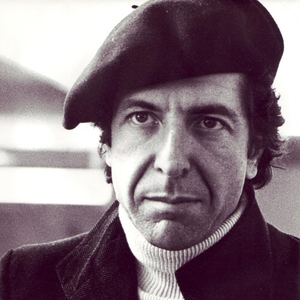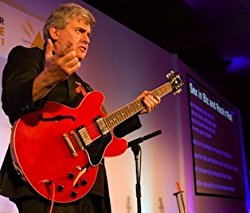Leonard Cohen R.I.P.
 A few years back I performed a tribute to Leonard Cohen at The Edinburgh Festival. As a result I became fascinated by the man behind the seemingly sombre songs, although I came to learn of a much lighter and humorous individual behind the poems through that process. In common with other poets who set their work to music such as Lou Reed, Joni Mitchell and Bob Dylan, Leonard Cohen’s work required a degree of attention that transcended the MTV age. He was unafraid to deal with life’s darker subjects such as war, hate, depression sex, religion and rock’n’roll. What then should we learn at the passing of this giant of poetry and music?
A few years back I performed a tribute to Leonard Cohen at The Edinburgh Festival. As a result I became fascinated by the man behind the seemingly sombre songs, although I came to learn of a much lighter and humorous individual behind the poems through that process. In common with other poets who set their work to music such as Lou Reed, Joni Mitchell and Bob Dylan, Leonard Cohen’s work required a degree of attention that transcended the MTV age. He was unafraid to deal with life’s darker subjects such as war, hate, depression sex, religion and rock’n’roll. What then should we learn at the passing of this giant of poetry and music?
Cohen on Creativity
Leonard Cohen is perhaps noted more for his poetry than his music. Indeed he was first and foremost a poet, only taking to music when he was 33 years old. His approach to creativity in his writing was often informed by his reclusive nature, having once bought a house on the Greek island of Hydra and been ordained as a Buddhist monk in 1996, taking on the name Jikan, meaning silence. In the 1960’s Cohen was on the fringe Andy Warhol’s fashionable Factory crowd, but never in the headlights of the movement, as someone who was probably an intuitive introvert with respect to his creativity. I discuss 5 approaches to creativity in the book “Leading Innovation, Creativity and Enterpriseâ€:
- Divinity – Creativity cannot be controlled and is a matter of forces outside the individual, some would say the work of the gods. People cite examples such as Mozart, Einstein, Prince as examples
- Pure luck – One has to wait for luck to arrive, another passive view of the creative process. The discovery of saccharine is a good example of pure serendipity
- Planned luck – One can increases the probability of purposeful creativity through careful preparation and planning.
- Hard work – Creativity is simply a matter of perspiration rather than inspiration
- Method – We can learn methods that replicate what naturally creative people do. Many creativity tools and techniques are essentially codified methods
Cohen is a great example of someone with an unconscious competence for creativity in songwriting and this is typical of some artists who either shun formal methods or perhaps are unaware of the methods they use naturally as part of their genius. Cohen’s quotes on songwriting seems to conform to the “pure luck / divinity†perspective of the creative muse:
“If I knew where the good songs came from, I’d go there more oftenâ€
“[My writing process is] like a bear stumbling into a beehive or a honey cache: I’m stumbling right into it and getting stuck, and it’s delicious and it’s horrible and I’m in it and it’s not very graceful and it’s very awkward and it’s very painful and yet there’s something inevitable about itâ€
The idea that divinity or pure accident / luck is needed for creativity is a very attractive one for artists but is more not so easy to transfer into the world of business. Imagine having to wait for 20 years for your creatives to “get in the moodâ€! In my work as a creativity consultant, I’m mostly interested in improving the probability of purposeful creativity and providing people with explicit methods that help increase the probability and purposefulness of their creativity. Cohen’s approach, beautiful though it is, is the work of a master craftsman. It however offers a deep insight into how the mind of a solo introvert creative works and mirrors my own approach when writing books and music, which I often pursue in the silence of night, although I have yet to retreat to a monastery to pursue my creative work.

Cohen on Leadership
Cohen had a real grip on leadership and authenticity, which he summed up in the following quotes from Cohen, Lou Reed and a story attributed to Ghandi:
“Act the way you’d like to be and soon you’ll be the way you act†– Leonard Cohen
“I do me better than anyone else – Lou Reedâ€
A mother took her young boy to meet Ghandi, who was the boy’s idol. The boy had become obsessed with eating sugar and nothing she did would change the habit. Gandhi listened to the woman carefully and replied: “Please come back after two weeks. I will talk to your son.†On meeting the boy again, Ghandi said “Boy, you should stop eating sugar. It is not good for your health.” The woman was confused and asked Ghandi why he did not tell him this two weeks ago. Gandhi smiled and whispered “I had to give up sugar myself first.â€
Cohen formed deep bonds of friendship with people, another hallmark of his connectivity as a leader in his field. When talking about Jennifer Warnes. He said that she sang backup for his 1980 tour, even though her career at the time was in much better shape than his. “So this is a real friend”, he said. “Someone who, in the face of great derision, has always supported meâ€.
I had the great fortune of hearing a rendition of one of Leonard’s songs when my friend Jordan Gray, star of The Voice UK, performed “Hallelujah†at one of my Music / Business showcase events at Sir Richard Branson’s Virgin Lounge. It is a sublime offering and Jordan named her album after a line from the song “The Baffled Kingâ€.
https://www.youtube.com/watch?v=uBSccmg9ApA
Leonard Cohen offers us deep insights into the creative process and the question of being your authentic self. Here is the song he performed with Judy Collins, which inspired this article. That’s no way to say goodbye … Leonard Cohen R.I.P. 1934 – 2016
https://www.youtube.com/watch?v=ZA92I_MtUAc
image credit: ukele-tabs.com
Wait! Before you go…
Choose how you want the latest innovation content delivered to you:
- Daily — RSS Feed — Email — Twitter — Facebook — Linkedin Today
- Weekly — Email Newsletter — Free Magazine — Linkedin Group
 Peter Cook leads Human Dynamics and The Academy of Rock, providing Keynotes, Organisational Development and Coaching. He is the author of seven books on business leadership. His three passions are science, business and music, having led innovation teams for 18 years to develop life-saving drugs including the first treatments for AIDS and the development of Human Insulin. Peter is Music and Business editor at Innovation Excellence. You can follow him on twitter @Academyofrock.
Peter Cook leads Human Dynamics and The Academy of Rock, providing Keynotes, Organisational Development and Coaching. He is the author of seven books on business leadership. His three passions are science, business and music, having led innovation teams for 18 years to develop life-saving drugs including the first treatments for AIDS and the development of Human Insulin. Peter is Music and Business editor at Innovation Excellence. You can follow him on twitter @Academyofrock.
NEVER MISS ANOTHER NEWSLETTER!
LATEST BLOGS
The Importance of Packaging
Let’s talk about packaging. Packaging can be thought about in many different ways, but if we think purely about the purpose of packaging first, we find the purpose is to: contain the product, communicate product information, …
Read MoreWhy the World Cup is a Big Deal
After living overseas in Germany and England and now coming back to the United States, I have a completely different perspective on Football (or Soccer as we call it in the United States). With the World Cup in full swing, I thought I would tackle the subject of Football and why it is the most popular sport in the world.
Read More


